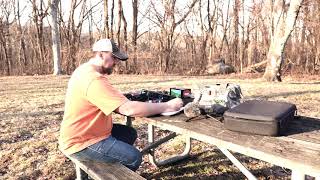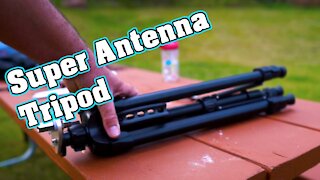NVIS Survival Antenna Test | Near Vertical Incidence Skywave | Emergency
Near vertical incidence skywave, or NVIS, is a skywave radio-wave propagation path that provides usable signals in the distances range — usually 0–650 km (0–400 miles). It is used for military and paramilitary communications, broadcasting,[1] especially in the tropics, and by radio amateurs for nearby contacts circumventing line-of-sight barriers. The radio waves travel near-vertically upwards into the ionosphere, where they are refracted back down and can be received within a circular region up to 650 km (400 miles) from the transmitter.[2] If the frequency is too high (that is, above the critical frequency of the ionospheric F layer), refraction fails to occur and if it is too low, absorption in the ionospheric D layer may reduce the signal strength.
There is no fundamental difference between NVIS and conventional skywave propagation; the practical distinction arises solely from different desirable radiation patterns of the antennas (near vertical for NVIS, near horizontal for conventional long-range skywave propagation).
-
 5:22
5:22
Ham Radio CQ
3 years ago $0.03 earnedGlass Mount Mobile Ham Radio Antenna Install ~ Storm Chasing Comms 2M 70CM
6264 -
 5:10
5:10
Ham Radio CQ
3 years ago $0.03 earnedNVIS Antenna Unbox Near Vertical Incidence Skywave | Survival Antenna
1291 -
 22:33
22:33
HamRadioCQ
3 years ago $0.07 earnedYaesu FT-891 in Woodlands | NVIS Antenna Experiment | Near Vertical
4502 -
 1:35
1:35
NJDOGGIECARE
3 years agoSurvival Food Taste Test
3072 -
 2:03
2:03
KGTV
4 years agoPlane makes emergency landing near school
2422 -
 2:10
2:10
Local Business Promotions
4 years ago $0.01 earnedEmergency 24 hour Plumber In Florida Near Me
311 -
 1:50
1:50
KGTV
4 years agoPlane makes emergency landing near El Cajon playground
196 -
 2:05
2:05
Local Business Promotions
4 years agoEmergency Plumber Near Me Jensen Beach Florida | 24 hr Plumber
40 -
 0:29
0:29
Newsy
4 years agoFDA Authorizes Emergency Use Of 15-Minute COVID-19 Test
560 -
 7:04
7:04
Ham Radio CQ
3 years ago $0.03 earnedMP1 Super Antenna Tripod Mount ~ 1:1 SWR Test Success!
3842